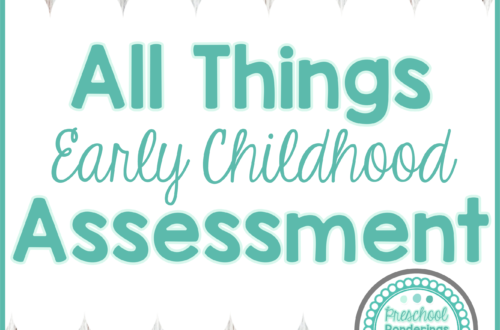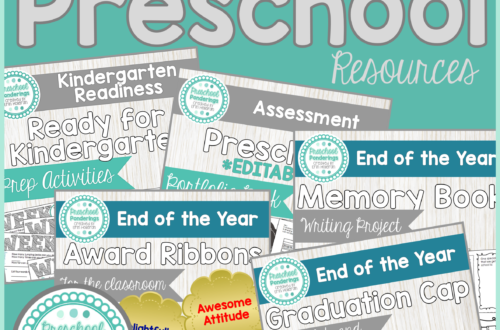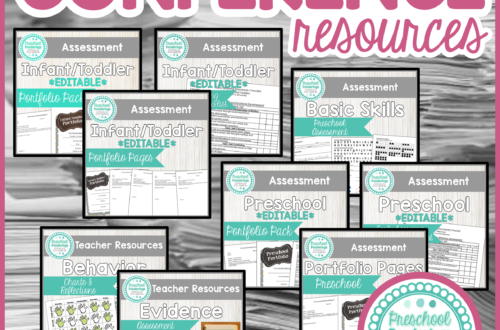assessments
-
My favorite assessment products
Teachers Pay Teachers is having a back to school boost sale today! Usually when there is a sale I like to share what’s on my wishlist, along with some of my favorite products from my store. Since I already did that here and here, I thought I’d share my favorite assessment products so that you can see what I use. Infant/Toddler Portfolio Pack: This product includes portfolio pages based on Early Learning Development Standards for Infants and Toddlers. Portfolio pages cover the following domains; Cognitive skills and general knowledge (including math, science, and social studies), Language and Literacy, Social Emotional Development, Physical Motor Development, Approaches towards learning (initiative, curiosity, etc.),…
-
What does assessment evidence look like in preschool?
Preschool assessments are different than the types of assessments we tend to see in elementary classrooms. They don’t require testing the children in the traditional sense, because we don’t expect our preschoolers to be able to sit down and answer multiple choice questions. There are other ways of determining what preschoolers know, and which skills they have mastered. These other strategies always produce evidence that we can use to support our total picture of a particular child. So what exactly does this evidence look like? It can take a variety of different forms, including; Artwork that children have created Photos of children participating in class activities Writing samples Cutting samples…
-
Friday Freebie – Anecdotal Notes
Happy Friday! I’ve noticed that summer weeks seem to fly by a lot faster than the rest of the weeks throughout the year. Today’s freebie is for those of you who’ve already begun to think about next year’s assessment systems. I’ve been talking about this subject all week so I wanted to share my anecdotal notes freebie with you. This is an easy way to track and organize your anecdotal notes and other important information. Check it out before enjoying your weekend!
-
Assessment strategies for preschool
My first “real” job was teaching toddlers at a NAEYC accredited child care center, so I jumped right into a position that required teachers to complete assessments for every child, I’ve never NOT done assessment. So over the years I’ve come up with some strategies that have helped me keep track of all of the evidence and data. Within the last couple of years I’ve turned some of those strategies into really great products that you can get from my TPT store, so you don’t have to reinvent the wheel, or use your valuable time developing these things on your own! Here are my favorites: If you’re looking for a complete…
-
What does preschool assessment look like?
Yesterday I shared some thoughts on how to talk to families about assessment, but part of explaining assessment is talking about what it looks like in the preschool classroom, and that can be really difficult. It’s so hard because there isn’t a right or wrong way to do it. That’s the beauty of preschool assessment, it can’t always be scheduled – you certainly can’t sit down and say “I’m going to observe Kate’s positive social skills today” but that gives you freedom to make it work for you. You might collect work samples from your writing activity on Tuesday, jot down a couple of anecdotal notes on Wednesday, and take…
-
Explaining assessment to families
Assessment in preschool is definitely a thing – it’s a huge part of what early childhood educators do every day, but most casual observers would never know that. This is because it’s not obvious. As teachers it important to be able to explain this unique assessment process to parents and family members so that they have a clear understanding of how we know what skills and concepts their child has mastered. There are two things that make preschool assessments just a little different; First, preschool assessments should be formative assessments. This simply means that you are using the results of any assessment to plan further activities and learning experiences. These…
-
Collecting Assessment Evidence
I’ve been doing a lot of work with assessments lately, and one of the most important aspects of assessment is collecting evidence to support any assessment scores and decisions. Personally, I think the most difficult thing about collecting all of this evidence if finding a way to organize it all and track what I’ve gathered and what I still need. To help myself keep all of that information organized, so I have it when I need it, I put together a evidence collection binder for each student. I bound 8 file folders – one for each domain that I collect evidence on, then I taped the bottom of each folder…
-
Informal assessments: What do your students know?
Before you can start any kind of project or theme exploration it is important to know what your students already understand about that particular topic. You don’t want to teach them things they already know, but you do want to be able to build upon the current knowledge and understanding. So how do you find this information out? There are a number of strategies that you can use, and all are considered informal assessment. Ask them. This seems really simple, but, have you ever gone up to a preschooler and said “What do you know about the farm?” You probably get a blank stare, not because they don’t know anything,…
-
Preparing for preschool conferences
April is almost here, and in my world April means parent-teacher conferences. Since I’m getting ready, I thought I would share my assessments process and all of my materials with you, get ready, this is going to be a long one! I start with three different assessments – yes, three. First, the portfolios. Each of my students has a digital portfolio, you can read more about them in this post and this post. Their digital portfolios are shared with their parents, so they can view them any time, but for their last conferences before kindergarten I print everything and put it in a binder. These portfolios include a page for…




